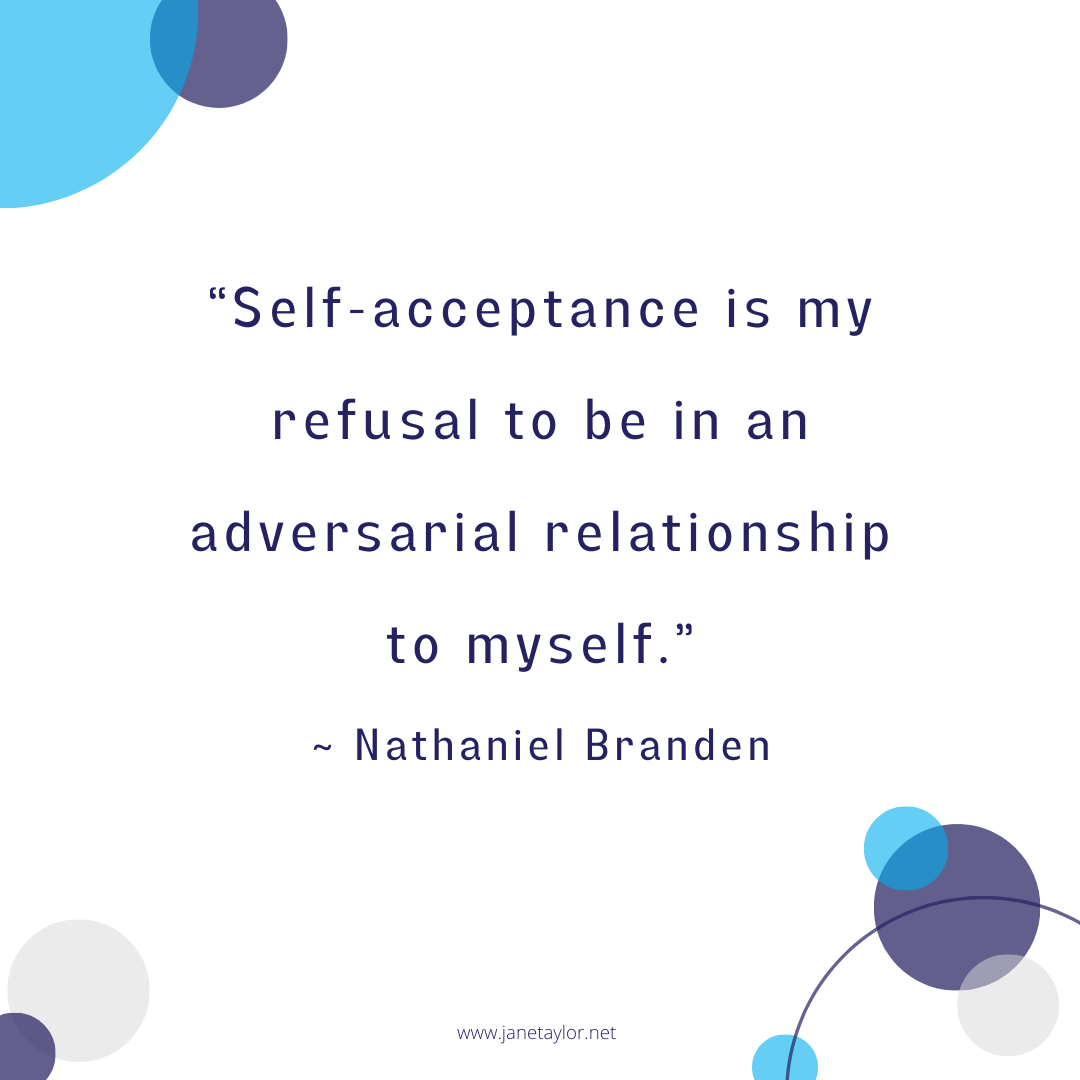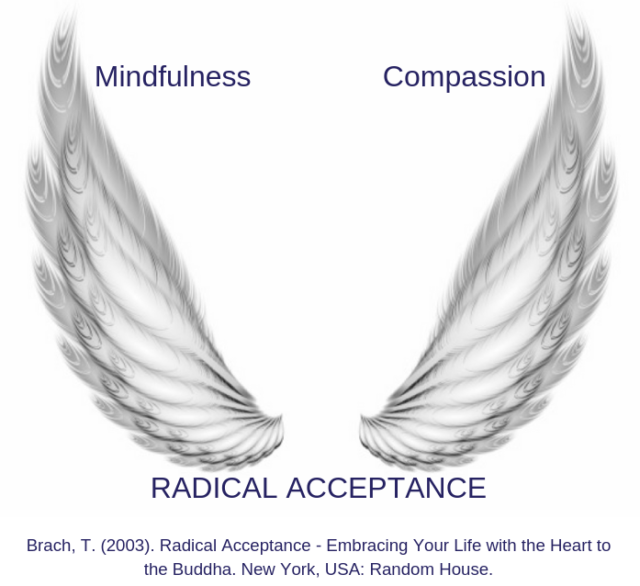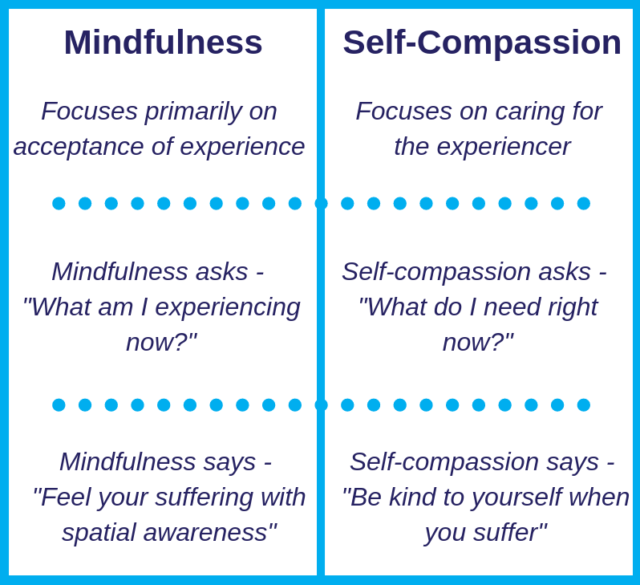How Do Mindfulness and Self-Compassion Relate to One Another?

As I was teaching mindfulness this week, a question come up – how do mindfulness and self-compassion relate to one another? When I first started learning about mindful self-compassion, I had a similar question, so following is some of what I discovered.
What is Mindfulness?
Mindfulness is often referred to as the opposite of resistance. Mindfulness in everyday life is the ultimate challenge and practice. It is a way of being, of seeing, of tapping into the full range of our humanity – often seen in playful children fully experiencing life in the here and now. There are a number of definitions of mindfulness, including one of the most famous ones by Jon Kabat-Zinn (1994) –
“as paying attention in a particular way: on purpose, in the present moment and non-judgementally” (p.4).
Bob Stahl and Elisha Goldstein (2010) report “in Sanskrit, it’s known as smrti, from the root word smr, meaning “to remember” and in Pali, the language of the earliest Buddhist scriptures, it’s known as sati (mindfulness)” (p.15).
What is Self-Compassion?
There are a number of well-known definitions on self-compassion. Christopher Germer in his book The Mindful Path to Self-Compassion: Freeing Yourself from Destructive Thoughts and Emotions refers to self-compassion as
“… simply giving the same kindness to ourselves that we would give to others.”
In Dr Kristin Neff’s book – Self-Compassion: Stop Beating Yourself Up and Leave Insecurity Behind, she talks about
“Self-compassion entails three core components. First, it requires self-kindness, that we be gentle and understanding with ourselves rather than harshly critical and judgmental. Second, it requires recognition of our common humanity, feeling connected with others in the experience of life rather than feeling isolated and alienated by our suffering. Third, it requires mindfulness – that we hold our experience in balanced awareness, rather than ignoring our pain or exaggerating it. We must achieve and combine these three essential elements in order to be truly self-compassionate.”
How Do Mindfulness and Self-Compassion Relate to One Another?
There are many ways, to share this relatedness, however I like the simplicity Tara Brach uses. She refers to the interconnectedness of mindfulness and compassion as radical acceptance. Brach uses the metaphor of a bird which has two wings – where one wing of the bird is clear seeing (i.e. mindfulness) and the other is our capacity to relate in a tender and sympathetic way to what we perceive (i.e compassion).

Another way of seeing the interconnectedness is articulated by Kristen Neff in the following clip. In the clip, Neff describes the Big M (mindfulness) umbrella (which is similar to what I have written in the above definition of mindfulness) and then the 4 aspects of mindfulness (the little m’s). The four aspects of mindfulness are –
m1 – paying attention to the experience in the present moment,
m2 – relating to experience without judgement or resistance (mindfulness = m1 / m2),
m3 – relating to the experiencer with the desire to alleviate suffering (compassion), and
m4 – understanding the nature of both experience and the experiencer (wisdom).
Even though the above examples refer to compassion, it includes compassion for self and others. We need mindfulness and compassion to work together – mindfulness helps to ensure that self-compassion isn’t used as a form of resistance and we need self-compassion to feel safe enough to open mindfully to difficult experiences.
The following graphic shares some insights in to mindfulness and self-compassion –

Over to You…
I hope this post has given you some insights in to how mindfulness and self-compassion relate to each other. Is there anything else you would add? If so, please feel free to share your insights below.
Also please remember these are words and they are not mindfulness or self-compassion. It is important to observe and take notice of your own experiences and become your own authority 🙂
If you are ready to reclaim your courage and take the next step towards freedom and opening your heart, why not join our Toolkit?
References
Brach, T. (2003). Radical Acceptance – Embracing Your Life with the Heart to the Buddha. New York, USA: Random House.
Germer, C. (2009). The Mindful Path to Self-Compassion: Freeing Yourself from Destructive Thoughts and Emotions. New York: Guilford Press.
Kabat-Zinn, J. (1994). Wherever You Go, There You Are – Mindfulness Meditation in Everyday Life. New York, USA: Hyperion.
Neff, K. (2011). Self-Compassion: The Proven Power of Being Kind to Yourself. New York, USA: HarperCollins Publishers.
Stahl, B., & Goldstein, E. (2010). A Mindfulness-Based Stress Reduction Workbook. Oakland, USA: New Harbinger Publications, Inc.
